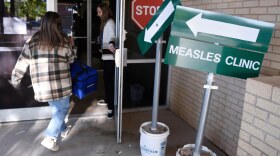-
Arizona’s three public universities have developed a new tool to help environmental officials find and cleanup abandoned mines in the state.
-
The Arizona House and Senate are poised to pass legislation mandating hospitals that receive public funding ask patients whether they're in the country legally.
-
International health officials plan to meet in a few months to reevaluate the United States’ measles-free status. Experts fear the vaccine-preventable virus has regained a foothold and that the U.S. may soon follow Canada in losing the achievement of having eliminated it.
-
Coconino County health officials are warning those who visited the Flagstaff Mall last Thursday that they may have been exposed to measles.
-
A Coconino County resident died of a rare case of pneumonic plague earlier this month. Dave Wagner, director of Northern Arizona University’s Pathogen and Microbiome Institute, spoke about the life cycle of plague and his research team’s efforts to develop a vaccine.
-
Mohave County health officials have reported a surge in whooping cough cases with 18 confirmed so far this year.
-
The Trump administration has canceled nine public health grants for Coconino County, totaling $1.8 million, creating ripple effects among rural communities and health care providers.
-
A bipartisan group of senators, including Arizona Sen. Mark Kelly, introduced legislation to address a syphilis epidemic that’s hit tribes especially hard.
-
Students were forced to move out of NAU's Mountain View Hall over the weekend after multiple bats found their way inside, including one that tested positive for rabies.
-
Updated COVID-19 shots are now available from pharmacies and healthcare providers. Northern Arizona University epidemiologist Dr. Paul Keim explains why the vaccine needed a revision and how it helps protect people from severe cases of the virus.

Play Live Radio
Next Up:
0:00
0:00
Available On Air Stations










